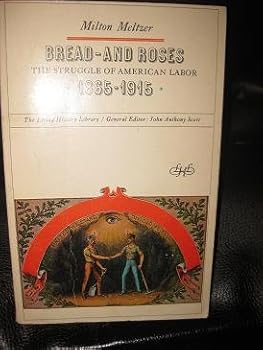Bread--And Roses: The Struggle of American Labor, 1865-1915
(Part of the The Living History Library Series)
Select Format
Select Condition 
Book Overview
Uses original source material to portray the momentous changes that took place in American labor, industry, and trade-unionism following the Civil War. Focuses on the work environment in this early... This description may be from another edition of this product.
Format:Hardcover
Language:English
ISBN:0816023719
ISBN13:9780816023714
Release Date:January 1967
Publisher:Facts on File
Length:167 Pages
Weight:2.85 lbs.
Customer Reviews
2 ratings
A must read for those interested in the fight for social justice
Published by Thriftbooks.com User , 15 years ago
This is an excellent book for those interested in the history of the fight for social justice. It is fairly shot but packs a lot of facts, puts you in the shoes of those who were struggling under downright appalling conditions of serfdom. It is a great preface to reading about the Roosevelt-era, particularly the measures taken to strengthen the working and middle classes under FDR, of which protecting unions (instead of crushing them as was government's position during the Gilded Age) was a central one.
New York Times Book Review
Published by Thriftbooks.com User , 19 years ago
(Click the author's name for several other editions of this book or the two "Other Editions" for more copies of the book) For Young Readers By A.H. Raskin New York Times Book Review January 28, 1968 The concern of this compelling book is with the march of the nation's industrial workers out of conditions as destructive of health and self-respect as any that had prevailed on Southern plantations under slavery. It is a one-dimensional story of battle by an infant labor movement against the forces of corporate greed in a period when all the institutions of government and polite society were on the side of the employer. The very fact that the book is episodic and often overdrawn adds to its usefulness in supplying a new generation of readers with some illumination things unions do now that they when large membership, huge treasuries and economic power sufficient to paralyze entire communities... Mr. Meltzer's pages, prickly with eyewitness accounts of unionism's birth pains in the sweatshops, the factories, the railroads and the mines, are a goad to revitalized activity in defense of industrial democracy and higher economic standards for those who remain on the outskirts of American affluence. Listen to this 1880 report by a textile mill superintended on how his mill insured labor peace when new technology enabled it to switch fro a process known as mule spinning to an alternate technique called ring-spinning. "The mule-spinners area tough crowd to deal with. A few years ago they were giving trouble at this mill, so one Saturday afternoon, after they had gone home, we started right in and smashed up a roomful of mules with sledgehammers. When the men came back on Monday morning, they were astonished to find that there was no work for them. That room is now full of ring framers run by girls." Often it was not the machinery but the workers who were smashed. Federal troops, the state militia, the police and hired thugs were at the call of the bosses when a strike got too big or too stubborn. Mr. Meltzer includes generous excerpts from John Reed's classic description of the 1914 massacre of strikers and their wives and children at the Rockefeller-owned coal mines at Ludlow, Colorado. No less heart-rending is Ray Stannard Baker's report on the great 1912 uprising of the textile workers in Lawrence, Massachusetts, under the slogan that gave the book its title, "We want bread and roses too." All the bloody way stations on the road to labor's present strength are points of call for Mr. Meltzer. There are Homestead and Pullman and Haymarket Square, where a bomb explosion in 1886 killed seven Chicago policeman and labor's immediate hopes for an eight-hour day. Four anarchist leaders were hanged for the bombing, though there was no credible evidence of guilt. Prophetically, one of the convicted men said on the scaffold after the hood had been fastened over his head: "There will come a time when out silence will be more powerful than the voice






